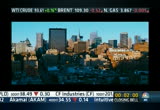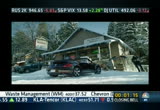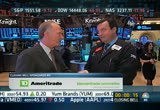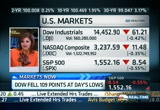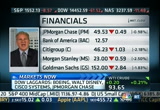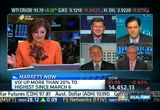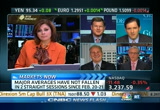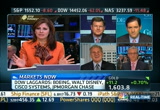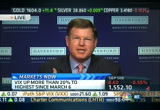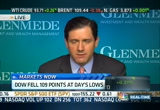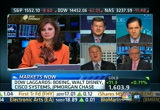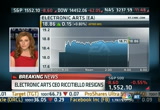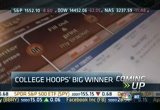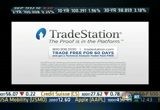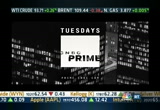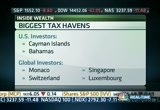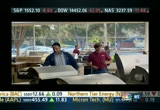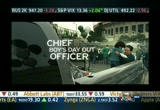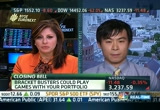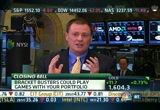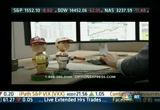tv Closing Bell With Maria Bartiromo CNBC March 18, 2013 4:00pm-5:00pm EDT
4:00 pm
♪ i don't want any trouble. i don't want any trouble either. ♪ [ engine turns over ] you know you forgot to take your mask off, right? [ siren wailing in distance ] ♪ [ male announcer ] introducing the all-new beetle convertible. now every day is a top-down day. that's the power of german engineering.
4:01 pm
and his new boss told him two things -- cook what you love, and save your money. joe doesn't know it yet, but he'll work his way up from busser to waiter to chef before opening a restaurant specializing in fish and game from the great northwest. he'll start investing early, he'll find some good people to help guide him, and he'll set money aside from his first day of work to his last, which isn't rocket science. it's just common sense. from td ameritrade. . 40 seconds left. downow is . 40 seconds left. the dow is down 66 points heading lower. ben willis, are you troubled by devevelopments in cyprus or are you reassured that we're only down 66 points today? >> i think we go further. i think the whole world should be very concerned that somebody believes in a one off in cyprus.
4:02 pm
con c confisca confisca confiscateion of private property. >> thank you very much. see you later. dow down about 60 points on the close. stand by. meredith whitney and john thain coming up on the second hour of "the closing bell." i'll see you tomorrow. and it is 4:00 on wall street. do you know where your money is? hi, everybody. welcome back to "the closing bell." i'm maria bartiromo on the floor of new york stock exchange. stocks closed lower after a flare up in the eurozone debt crisis. take a look at how we're settling today on this monday afternoon on wall street. dow jones industrial average down 60 points. almost one-half of 1% lower. 14453 after a busy close on friday. nasdaq composite under selling pressure, down 11.5 points. it may be red across the board
4:03 pm
for major averages. hank smith points out if the cyprus bailout had happened last year, the dow would have likely shed 300 points on the open alone. this proves that the united states is clearly, as he puts it, the best house in a bad neighborhood. is that the right picture to paint? joining me right now along with hank is jason pride, peter schiff of euro pacific capital and our own bob pisani. peter schiff, let me kick it off with you and get your take on what's going on in cyprus right now. what's the impact? >> a lot of people are hoping what happens in cyprus stays in cyprus. i wouldn't be so sure. i think bank depositors including depositors here in the united states have to be concerned about the value of their deposits. because if we have a major bank failure in the united states, you know, there's no way the fdic has the money to cover the potential losses. so we would have to have a huge bailout like t.a.r.p. and where would the money come from? and even if there is a bailout and the fed has to print money, the losses to depositors to
4:04 pm
inflation will be far greater than what the cyprus depositors are losing due to this tax. >> hank smith, it is pretty extraordinary depositors have to pay for a bailout they didn't necessarily authorize. what do you think about what peter said? is this a recipe that would be used elsewhere in the world? >> i highly down it, maria. look, i think we should take great confidence in our banking system now compared to where we were four or five years ago. our banks are very healthy. t.a.r.p. was a good thing. it protected the financial system and the confidence in the financial system. and our banks are in great shape -- >> they're in the worst shape they've ever been. >> oh, no. >> they're a few interest rate hikes away from insolvency. that's why the fed is keeping rates at zero. >> wait a second. peter, you're saying the banks are a couple interest point ace way from insolvency? >> why to you think when the fed
4:05 pm
did the stress tests they didn't ask the banks to stress test a collapse in the bond market? they only looked at the stock market or maybe real estate. when interest rates rise substantially, the major banks are going to fail. their balance sheets are not going to be able to handle it. >> how do you explain the billions plus in profit that jpmorgan made last year? >> they're making a -- >> how do you explain the capital levels on the balance sheets of all these banks that are way above even tier one capital, which is the bottom regulation? >> maria, they're speculating with cheap money. when the cheap money goes away the losses are going to be there, they're going to be enormous. what do you think is going to happen to bond portfolios? portfolios of real estate loans? what's going to happen when the fed takes the punch bowl away? >> maria -- >> yes? >> maria, this is jason. i don't really agree with what your other guest here is saying. the banks have greatly improved their financial condition. yes, it's cheap money, but the cheap money's here.
4:06 pm
it's going to be here for quite some time. what i do agree with him is, is the cyprus issue is something to watch. this is an example of policy mistake. we are still in a period of deleveraging. policy mistakes can happen. spain itself has to refinance 20% of their gdp in new debt issued this year. that's a lot of money to actually have to issue to the markets, and there are more than enough opportunities for missteps by policymakers, which is what we're seeing the reaction to today in the markets. >> remember, the first mistake, though, was to insure deposits in the first place. that's a big problem. government should not insure bank deposits. it's a tremendous moral hazard. one of the main reasons the banks make reckless loans. depositors don't care what the banks do with their money because the government's there. >> that's one of the guardrails to oversee these banks. >> but we don't need it. we didn't always have it. and there are other nations that don't have any deposit insurance and their banking system is much sounder than ours.
4:07 pm
>> they're asking depositors to pay for the bailout. >> no, no, no, no. there are no bailouts in those country. the countries that don't have deposit insurance have a healthier banking system. because we have this deposit insurance, american depositors don't care how reckless their banks are. the banks don't care because the depositors don't care. it's a terrible system. eventually it's going to implode. people who have money on deposit in u.s. banks are going to take huge losses one way or another. either they're going to lose their deposits, or their deposits are going to lose value because of all the inflation that's going to have to be created to bail out the banks. >> hank, you own bank stocks. are you not worried about this? >> no. in fact, in a rising rate environment, as long as rates don't spike up dramatically overnight, in a rising rate environment, banks are going to make more money. >> no, they're not. >> and become even stronger and healthier. and we own two of the highest quality banks in the world, jpmorgan and wells fargo. >> their customers can't -- the
4:08 pm
borrowers can't afford to pay the higher rates. what's going to happen to the value of the existing collateral when interest rates spike? eventually they're going to spike. the fed has waited far too long to raise them. when they rise they'll rise faster and higher than anyone believes. >> bob pisani, we're not really seeing the impact -- go ahead, jason. >> sure. injury. i'll add in here. i don't fully agree with what your guest is saying here as far as immediately rising rates and banks falling apart. having said that, i think the world has changed and we have to recognize the big picture here. number one, bank business models are not the same they used to be. they're not the great investments they used to be. number two, as far as theov overall economic situation is concerned whether you're looking at bank debt or government debt we have too much. somebody has to pay for it. we have to introduce austerity to the system. we have to introduce bank writeoffs. we have to bring the system back to a more normal state. that's going to take a long time to repair. it's going to hold growth down for a considerable period of time. it's going to make the
4:09 pm
likelihood of policy mistakes higher than they are normal. >> that's why what happened today was very important. everybody agrees it was a blunder to include insured depositors in having to pay for part of this. >> i don't agree it was a blunder. >> all right. >> depositors are going to pay one way or another. they're not innocent bystanders. >> i apologize. i think it's a blunder to include them. okay? depositors are unsecured creditors. thank you. i think you were going that way. i agree with that. what this is today is an indication, a shot across the bow, that unsecured creditors like depositors may be drawn into this. i think other countries will leave out the insured depositors part of this thing. but other ones above that, i think they may be fair game in the future. >> it's better than hitting taxpayers in general who didn't put money in these shaky banks or just creating inflation, just printing a bunch of money to pretend there are no losses. but pushing the losses on to currency so that prices go up
4:10 pm
and the deposits lose value. >> i agree depositors above those who are insured can be held responsible and may, in fact, be held partly responsible for some of this. >> we got to jump. breaking news. we'll come back to this subject. appreciate your time. want to hear how you're putting money to work, gentlemen, later on. julia boorstin breaking news right now. >> electronic art ceo john ciccitiello is stepping down march 30th. the company continues its search for a permanent ceo, larry probst will take over as executive chairman. he is form r ceo of electronic arts. riccitiello has been ceo since 2007. in that period the company has suffered. the stock down fairly dramatically over that time period as the company has suffered with industry wide declines in video game sales and increasing competition from the likes of zynga and other social and mobile game makers. the stock reacting positively.
4:11 pm
up about 1%. we'll be waiting to see who the company finds to take over after riccitiello leaves. the mediterranean sea, doesn't it conjure up thoughts of rest and relaxation? not financial ruin? the island nation of cyprus has the entire world watching tonight as its banks remain closed. could that happen ever here? meredith whitney will speak with me exclusively about that. she also has a couple of bullish call on some big bank names you won't want to miss. join us for that. also ahead, cit ceo john thain here exclusively. he'll offer his take on the potential for european contagion. plus the latest on the rumored sale of his company. later, march madness is here. we'll tell you about a bracket buster you wish was playing in your portfolio. you're watching "the closing bell" on cnbc, first in business worldwide. [ male announcer ] this is a reason to look twice. the stunning lexus es. get great values on your favorite lexus models during the command performance sales event.
4:13 pm
4:14 pm
okay. [ male announcer ] with citibank's popmoney, dan can easily send money by email right from his citibank account. nice job ben. [ male announcer ] next up, the gutters. citibank popmoney. easier banking. standard at citibank. welcome welcome back. the dow ending well off of session lows today. still in the red. josh lipton has a look at the financials now. >> hey, maria. look at the s&p 500. down about 16 points. the lows of the session. finishes, though, down about eight points. financials were the worst performing industry group. look at citigroup, morgan stanley, both down more than 2%.
4:15 pm
bank of america finishes flat on the day. bank of america still up about 8% on the year. maria, back to you. >> josh, thank you so much. bank of america. my next guest calls it the stock to own in 2013. that is the stock meredith whitney is bullish on. joining me right now in a cnbc exclusive to talk more about that is meredith whitney of meredith whitney adviser group. good to see you. let's talk about your call on bank of america. obviously b of a came out the winner in the stress tests last week. >> one of the most undervalued stocks going into the stress test. what's amazing about this is very rarely do these big banks have both value, catalyst and momentum. and bank of america had all of that. so up 20% just in the last three months. and probably another 20% from here. and it will continue having momentum. this catalyst, when i say it's a stock to own, the stress test was a huge catalyst for this name. it's been this stealth, you know, stealth operator stock --
4:16 pm
they announced cost cutting measures back in 2010. no bank has announced the kind of cost cutting measures that bank of america did. it takes two years. two, three years. anybody who's following bank of america is following by a, you know, a big amount. >> the stock's at $12.56 a share. how much higher can this stock go? >> easily 15. easily 15. >> that's in the near term. >> over the near term. i mean, over the longer term, over the next year and a half, in the 20s. >> in the 20s for b of a. >> not sexy stuff. not sexy stuff. it's not revenue growth. >> making money is sexy to me. >> it's got to be, right? it's all cost cutting. it's all operating leverage. i don't have a lot of revenue growth expectations for the big banks in general. but they are sell things. they're getting smaller. going to tlau off a lot of excess capital. buying back $5 billion worth of shares just over the next 12 months. so more of f that to om.
4:17 pm
>> i want to get to some of the other banks in a minute. let me ask you about cyprus. the story of the day. they're getting deposits, floating this idea that depositors are going to be taxed so that they can pay for the bailout. what's your take on what's going on in cyprus and do you think this is something that actually could materialize elsewhere in the world? in particular, does it have an impact on the u.s. banks? >> that's always the risk, right? the financial system is inherently a faith based system. so if people lose faith in that system, you're going to have runs on the bank. what people -- we can probably now talk about it now. there were runs on the banks in the u.s. in summer of '08. indy mac, wachovia, washington mutual. something like this really scary where you close down the system and everyone worries their deposits are at risk then the taxing issue is another issue. someone earlier on the program said the u.s. is a desirable safety and sound place to put money. you have to be bullish on u.s. equities here.
4:18 pm
because you have so much offshore money coming into the u.s. looking for some place safe and sound. >> there just aren't a lot of returns elsewhere from those companies that actually pay dividends. for so long we were talking about the regulatory environment in the united states. i mean, is that not an issue anymore? you have the london wale implications at jpmorgan. is that going to force vocal rules to actually get implemented? is that not a worry anymore for you, for the banks? >> the regulatory changes are always a worry for me. because they're like a drone attack. all of a sudden you don't know where they're coming from. all of a sudden a new, you know, other or new politician is creating one for their own political ambition. or the rules are changing constantly. so you're always on the defense. i think as far as the banks are concerned, and as far as, you know, what happened on friday with jpmorgan is concerned, it is clear that you have across the aisle, bipartisan support to go after the financials and go after the banks. the banks now being so well capitalized are also a great
4:19 pm
place to go and try to exact money. exact funds. that's certainly what the consumer finance protection bureau is doing. i think that's what a.g.s are going to do. it will be a steady beatdown. there's nothing going to be as huge as the mortgage clickback. it will be an omnipresent concern. i think that's why you see a certain portion of discount in the stocks. >> it doesn't bother you about bank of america. that's the stock you said is the most owned for 2013? >> all this is factored into bank of america. but bank of america has the most operating leverage of any of these big financials. so, wryeah, it always bothers m. but they have so much stuff in the rear-view mirror as opposed to maybe some other banks. >> what's your take on jpmorgan? i mean, watching those hearings, the hearing on friday over the london wale was interesting to me. there were a lot of comments from carl levin that i was not expecting. it seems like this is very much out there and it's an unknown. how do you see it? >> it seemed like the -- it
4:20 pm
seemed like congress got a lot of momentum on friday. >> i know this is not a stock you're recommending. >> not a stock i'm recommending. you know, they've come a long way. they don't have as much cost cutting to do as the rest of the group. so just because they're probably in a better position than a lot of other banks, there's less upside in my opinion. there's no way to slice it. it was bad. you know, it reminded me of how bad it was seeing goldman sachs in the same position. and it took goldman a long time to get over that. and it will probably take jpmorgan a considerable amount of time to get over it. >> let me ask you about discover. you raised your price target on discover financial services. what's the opportunity there? >> there's over 30% opportunity in discover inside of this year. discover has been an unbelievable name. largely because it is taking market share from a lot of the bank. but it's also providing liquidity where the banks aren't providing liquidity. so it's an over 20% return on equity company.
4:21 pm
it's one of the true growth companies within financials. you know, i was late to upgrade the stock. we've been constructive on the stock since 2010, but i was waiting for a better price point, entry point. and i was just wrong. finally i pulled the trigger in december. they had an investor meeting last week. it's all guns blazing on this name. i mean, this is -- from a pure growth perspective, $20 billion market cap. it's probably double that in the next two years. >> what did you learn from the "c" car, from the capital plans we hear from the fed last week? >> i mean, not much. i mean, a lot of what we baked into our analysis and our recommendations was -- came true within the c car. i think i learned and i probably expected this a little bit before this, that the banks are still pretty scared. so they're not asking for a lot. so they're not as aggressive, even -- >> you're right.
4:22 pm
>> -- american express that is so well positioned financially, not as aggressive in terms of going for it, in terms of returning shareholder capital. >> amex did raise the dividend. >> yeah. >> i was expecting more dividend increases. but i guess the fed has put out the word, be conservative, and that's exactly what these banks are doing. >> they're worried about another big hiccup in earnings. you commit yourself to a payout ratio that all of a sudden you might have to cut. you can always suspend a share repurchase program. it's much more difficult to make big changes on your dividend policy as we learned in '08. >> are there areas of the banking sector that you think are better poised than others? i mean, i know you luike bank o america and discovery. are these specific stock calls or is there an area of banks that perhaps is immune to some of the other issues? >> bank of america very much is a specific stock call. discover very much is an industry call to the extent that if you look at sort of an obama play, if you will, you're getting a larger and larger
4:23 pm
portion of americans that don't qualify for traditional credit. and discover, while it's still a prime lender, is moving into that market. that's a -- it's a specific stock, but there's -- i think probably one of the best areas within financials is where the regulars have created an area where there's so much demand because borrowers' needs are not getting met. and that is effectively a shadow industry that's developing inside of the united states that's growing dramatically, that's, you know, that is not under the jury diction of tisdi consumer finance protection bureau. also importantly i'm a big advocate that parts of the united states are growing faster than emergining markets. so you have louisiana growing gdp on a double digit basis. >> you've luked the ag states for a long time. >> i like the ag states. anything exposed to the energy
4:24 pm
states, too. the big banks don't have a large concentration to those areas. they're well exposed, but they don't have a large concentration. >> would you put new money to work in this market right here? >> yeah. absolutely. bank of america is -- >> i mean the broader market given the fact that last week we were hitting record after record after record. >> without a doubt. i have not been this constructive, this bullish on the u.s. and equities in my career. >> meredith, good to have you on the program. thank you so much. meredith whitney joining us on banks and the market. closed banks, protesters in the streets. the revolt in cyprus over ordinary depositors paying for the bailout is rocking the world and has people wondering if another eurozone country could be next. or, worse, could it happen here? exclusive reaction from john thain, head of cit group and former ceo of merrill lynch. also cit's turnaround from bankruptcy and whether it is up for sale. stick around for john thain. back in a moment. announcer: where can an investor
4:25 pm
be a name and not a number? scottrade. ron: i'm never alone with scottrade. i can always call or stop by my local office. they're nearby and ready to help. so when i have questions, i can talk to someone who knows exactly how i trade. because i don't trade like everybody. i trade like me. that's why i'm with scottrade. announcer: scottrade- proud to be ranked "best overall client experience." it's not what you think. it's a phoenix with 4 wheels. it's a hawk with night vision goggles.
4:26 pm
it's marching to the beat of a different drum. and where beauty meets brains. it's big ideas with smaller footprints. and knowing there's always more in the world to see. it's the all-new lincoln mkz. ...amelia... neil and buzz: for teaching us that you can't create the future... by clinging to the past. and with that: you're history. instead of looking behind... delta is looking beyond. 80 thousand of us investing billions... in everything from the best experiences below... to the finest comforts above. we're not simply saluting history... we're making it. try running four.ning a restaurant is hard,
4:27 pm
fortunately we've got ink. it gives us 5x the rewards on our internet, phone charges and cable, plus at office supply stores. rewards we put right back into our business. this is the only thing we've ever wanted to do and ink helps us do it. make your mark with ink from chase. welcome back. europe's debt crisis taking an ugly turn in cyprus today. depositors trying to avoid a surprise tax on their savings accounts. they're facing a bank lockup until at least thursday. the banks will be closed. part of cyprus's woes stem from its reputation as a tax haven for the wealthy. is another destination of wealth in danger following cyprus's lead? wealth editor robert frank with that angle. >> cyprus has shaken the world of tax havens and the multitrillion dollar economy of offshoring.
4:28 pm
cyprus, of course, a classic tax haven for the wealthy. russians invested more than $119 billion in cyprus in 2011 alone. they accounted for about a third of total dpos its. the new tax on deposits, let's call it what it is, a wealth tax, has americans worrying about other tax havens. more than $20 trillion held around the world in offshore havens. their favorite tax havens are in the caribbean. namely the cayman islands, bahamas, british virgin islands. globally the channel islands, monaco, switzerland and swing pore. caribbean countries in much better financial shape and more stable legal systems than cyprus. the capital structure of some of these offshore banks remains a mystery. governments in the tiny island nations are notoriously prone to corruption and sudden policy shift.
4:29 pm
many say cyprus isn't likely to repeat soon. the crisis is another reason offshoring may become more risky for the world's wealthy. >> thank you so much, robert frank. i'll talk exclusively with john thain next. the potential for europe crisis to spread here. later, march madness is here. should you keep your portfolio on the bench during the tournament? stay with us.
4:30 pm
but we can still help you see your big picture. with the fidelity guided portfolio summary, you choose which accounts to track and use fidelity's analytics to spot trends, gain insights, and figure out what you want to do next. all in one place. i'm meredith stoddard and i helped create the fidelity guided portfolio summary. it's one more innovative reason serious investors are choosing fidelity. now get 200 free trades when you open an account. ♪ here we are, me and you ♪ on the road ♪ and we know that it goes on and on ♪ [ female announcer ] you're the boss of your life. in charge of making memories and keeping promises. ask your financial professional how lincoln financial can help you take charge of your future. ♪ ♪ oh, oh, all the way
4:32 pm
welcome back. my next guest is a wall street veteran who turned around the new york stock exchange and is now on another turnaround mission. as chairman and ceo of cit group. john thain joins us now in a cnbc exclusive. good to see you. thank you very much for joining us. >> thanks for asking me to be on, maria. >> i know there's a lot to get to. i want to first talk about where you are. you're surrounded by literally 25 tons of food in the lobby of cit headquarters. what's that all about, john? >> well, first of all, i think right now it's over 30 tons. >> 30 tons of food. >> and we were -- 30 tons of
4:33 pm
food. that's what's surrounding me right now. we were inspired by our colleagues in jacksonville, florida, who were led by trish philbin. and they over the last seven years have raised 90 tons of food for charitable organizations in florida. we decided we wanted to adopt this across all of our company. so we here in livingston, and i'm tremendously proud of our employees, over the last two weeks we have collected over 30 tons of food. this will go to the interfaith food pantry. they feed over 300 families every week. these are primarily lower income families with working parents. and senior citizens who live on fixed incomes. and this has just been a great, great success. >> so where did the food come from specifically? and tell us again what charities it's going to, john. >> well, so the charity is the interfaith food pantry. it's a food pantry based here in
4:34 pm
morristown, new jersey. it distributes food to needy families here in this local area. the food was collected by our employees. and so they went out. they bought food. they collected food. they went together in groups. they actually rented trucks and they brought all of this food here into the lobby. so 30 tons of food have been transported by the employees here in livingston to be distributed to the interfaith food pantry. >> very nice. we're watching the video of you taking the food and moving it into the lobby. great charitable work there, john. we want to hear really your view of the world as well while we have you. i mean, cit obviously has a window into so many sectors. small, mid-cap sectors around the world. tell us what you're seeing in terms of economic strength and woes. >> well, so let's start in the u.s. first. we have a number of businesses in the u.s. we lend into the middle market. we lease rail cars. we lease airplanes.
4:35 pm
and i think the u.s. economy is growing. it's just not growing terribly quickly. so 2% gdp growth plus or minus. and that's -- that's creating some amount of growth, but it's not creating a lot of jobs. so you can see that in the statistics. around the rest of the world, i think the concern right now is obviously what's going on in the eurozone, particularly cyprus. i am particularly worried about the idea that you can have insured deposits that then have the government expropriate 6.75%. that undermines the concept of insured deposits. >> i want to ask you about that. how does this play out? is this a recipe that could ultimately come up here or in other areas where insured depositors are actually paying for a bailout that they never asked for? >> well, i certainly hope it doesn't come here. i don't think that it will. i think the real question is, why did the european union and the imf think this was a good
4:36 pm
idea? i mean, it's one thing to deal with deposits that are not insured. it's certainly another thing to think about including debt holders. but the idea that small investors, the idea that insured deposits would have forcibly a portion of their deposits taken away from them really a new concept and not a good one. >> john, there are reports that cit is adding a 1% surcharge to jc penny invoices. do you feel they're a credit risk? this feels like cyprus a little, john. >> we never comment about any of our particular clients. >> do you have a 1% surcharge on jc penney invoices? >> as i said, we're not going to comment about any particular client. we do as a matter of normal business practice sometime apply surcharges to some of our customers. but we don't talk about that. >> and you would -- just to get
4:37 pm
this straight, you would apply a surcharge when there's a credit risk? you're just basically covering yourself? >> no. that's not really true. any client, so, again, i'm not talking about anyone in particular. >> yeah. i understand. broadly speaking. >> so broadly speaking, when we provide factoring services where we're basically taking the credit risk of that client, we try to price that appropriately. and that's all we would ever be doing. >> i understand. okay. so you just -- you're pricing it depending on what you're seeing out there in a customer's corner or a sector or environment. john, a lot of talk obviously that you are shopping cit around. can you go it alone going forward given the fact that your competitors have much deeper liquidity? >> so, maria, you asked me this question the last time i was on your show. and i don't see why you think the answer is any different today. we're doing fine. we're lending into the middle market. our fourth quarter numbers were great. we're earning money. we're making loans.
4:38 pm
as a matter of fact, we now are originating almost 99% of our u.s. assets in our bank. our bank has over $5 billion of internet deposits. so we're in very good shape. >> can you -- is there a road to getting the cost of funding even lower? we know that we're pretty much in heaven when it comes to the cost of funding here with interest rates where they are. but is there a road to getting an even better situation to acquire, to get an even tedeepe story at cit to best compete with some of the guys around you that actually have deep liquidity and deposit pools? that's really the question, isn't it? >> well, sure, maria. so in the last 2 1/2 years we have refinanced or repaid $31 billion in debt. so all of the debt that came out of the bankruptcy has been repaid or refinanced. we then started to originate most of our u.s. volume in our bank. and our bank has very
4:39 pm
competitive rates. we sell one year, two year cds in the 1% to 3% range. we've been very successful in raising those deposits. today we have about $3 billion of cash in our bank. so we have plenty of fire power to make loans. >> so that fire power is there for loans, not necessarily the earmarks for a deal or for anything else? >> that's correct. just in the fourth quarter of last year, we funded over 3 billion tl billion of new loans and leases. >> in terms of the credit healthiness out there, you think that the u.s. in terms of the customers who are actually doing that lending -- on the other side of those loans, how would you characterize the health of them? >> so we lend into the middle market. so we lend to middle market companies. those are the companies that really are the driver of the u.s. economy. and, where hyes, they're in ver
4:40 pm
shape. they're generally optimistic about their revenue outlook. they tend to have a lot of cash on their balance sheets. they are genuinely concerned about the health care costs, taxes, and regulatory environment. that's the primary reason they don't hire more people. but their businesses are actually doing fine. >> john, i know i asked you this the last time. believe me. it's just that every time you leave then we hear more reports of wells fargo is trying to acquire cit. t.d. bank. has the price not been right? >> well, i really think you need to get wells fargo or t.d. on your show and ask them that question. >> all right. let me ask you about something that i know is near and dear to your heart. the new york stock exchange. what's your take, john, at the deal to acquire n -- he told me last week he's going to spin out some of the european exchanges. as you know he's got five european exchanges that he's going to try to ipo.
4:41 pm
>> even when i was at the new york stock exchange, the combination of nyse euronex and life made a lot of strategic sense. life is primarily european futures. combining that business with ice in the u.s. made a lot of strategic sense. and that transaction finally came about. >> yeah. i mean, i guess in terms of dodd/frank, in terms of the regulatory environment out there, is that a catalyst to see even further consolidation or deal flow in the financial services industry? what's your take on the regulatory environment and what it looks like in the coming six months to a year? >> well, i think, maria, you have to separate the largest financial institutions from kind of everyone else. so for the vast majority of the middle-sized and smaller financial institutions, the cost of the regulatory environment, the cost of complying with dodd/frank should actually lead to more consolidation.
4:42 pm
that really hasn't happened yet. but that should be the result. and we'll have to wait and see. >> do you worry about the regulatory environment changing, really ramping up for financials, the larger companies? is that going to hamper businesses and their willingness to put money to work? >> well, it's a -- it's a huge cost. the financial regulations and much of dodd/frank is still in the process of being implemented. you know, there's pieces of dodd/frank that i think were quite good. so the higher capital levels are good. and they certainly make the u.s. financial system much healthier today. but there's also a tremendous regulatory burden in complying with all the rules. and that really remains to be seen how that's going to impact many, many of the middle market and smaller-sized financial institutions. >> all right. really, really good information, john. we love your insights on all this stuff. thousand, you are surrounded by all of that food. is this going to be a new era in terms of philanthropy? i know that cit has been very
4:43 pm
charitable already before this. but 30 tons of food sent to all these charities, is it a new day in terms of charitable contributions and philanthropy at cit? >> well, citphilanthropic. we really want to be a very good neighbor. i think the ability to collect and distribute 30 tons of food is pretty spectacular achievement. really everyone here in this building, all of our employees, have chipped in to do this. i think the biggest challenge will be whether we can surpass 30 tons next year. >> yeah, really. we'll be watching, john. we hope to talk to you again. good to talk with you. thank you so much. >> thanks, maria. >> see you soon. john thain, chaurm and ceo at cit group. what team is the biggest winner in college basketball? don't check the national rankings. check the balance sheets. why is a professor warning not to touch your portfolio
4:44 pm
during march madness? stay with us. [ male announcer ] just when you thought you had experienced performance a new ride comes along and changes everything. the powerful gs. get great values on your favorite lexus models during the command performance sales event. this is the pursuit of perfection. only hertz gives you a carfirmation. hey, this is challenger. i'll be waiting for you in stall 5. it confirms your reservation and the location your car is in, the moment you land. it's just another way you'll be traveling at the spef hertz.
4:45 pm
4:46 pm
otherworldly things. but there are some things i've never seen before. this ge jet engine can understand 5,000 data samples per second. which is good for business. because planes use less fuel, spend less time on the ground and more time in the air. suddenly, faraway places don't seem so...far away. ♪ all all right. march madness kicks off tomorrow. colleges across the country are counting on the tournament to raise their profiles as well as their bottom lines. brian shactman now looking at the most profitable team in college hoops. brian? >> i know you filled your bracket out already, maria. let me give you a little hint. not duke, north carolina or kentucky. actually in kentucky. but the most profitable basketball program in the country also happens to be the tournament's number one overall seed. if you're listening and not watching it's louisville.
4:47 pm
look at the numbers. it's not even close, folks. more than $40 million in revenue. profit close to 25. other sources tell me it could be as high as $28 million. legendary programs like kansas, north carolina, kentucky are about 20% behind in terms of profits, begging the question how does louisville do it? >> that's largely due to the new kfc yum center that's a few years old. they also get $20 million in donations from alumni, which is larger than most schools. overall athletic budgets in basketball. >> the cardinals draw more than 20,000 a game. one of only three hoops schools to do that. like the nba and not like most ncaa programs you can even get a beer there. >> there are several nba teams that don't come close to drawing over 20,000 fans. also the average ticket price for university of louisville basketball is $35 which doesn't seem that expensive, but, again, it's more expensive than the average ticket price for about seven nba teams.
4:48 pm
>> keep in mind the average ticket price across the nba, according to tick iq, is $123. pros play more than double the amount of home days, ma rmaria. it's incredible the amount of money they make and take in in revenue. >> if you're looking to win big during march madness you better pay more attention to your bracket than your portfolio. one business school professor says investors see little gain during periods of big sporting events. breaking it down is the author behind the study, alex edmonds. giving us the take from where all the action is here on the floor of the-- alex, you studie impact of major sports events on market returns. as we're heading into march madness why should investors hold steady, not make any big moves during this tournament? >> thanks for having me on the show. what we show in our paper is
4:49 pm
that international sporting defeats have a significant effect on stock market returns. when a country gets knocked out of the world cup the stock market on the next day falls by half a percent. this is $16 billion when applied to the uk stock market. this seems madness in itself. because this doesn't change profits or dividends. but it shows that investor behavior are affected by emotions such as a sporting defeat. because investors want to make rational decisions during a period such as march madness they should stay away. >> what's your rationale? during period of exciting tournaments and sporting events, people have knee netwojerk reac or what? to what do you attribute this finding? >> so we attribute this finding to the negative impact a sporting defeat has on investor mood. i know in theory the stock market should be driven by profits and dividends. but the people who trade stocks are not compute r. they're human beings. they're affected by emotions. when england lost to argentina in the 1998 world cup heart
4:50 pm
attacks went up over the next few days. this is something that can translate into stock market behavior. >> let's find out what matt sees when he's on the floor of the exchange. you're here on the floor when games are being played. what's the atmosphere like? do you buy into the study? >> it's funny you would actually have a study on this as far as i'm concerned. when we're down here if you can multitask and do numerous things and watch numerous screens at once which we do all day we can watch basketball and trade stocks at the same time. >> i remember being down here during the o.j. trial. and, by the way, i think you know what happened during the o.j. trial. volume absolutely stopped. >> yeah. volume could stop on thursday and friday this year. because this year is a stock -- is a basketball picker's dream. there's a lot of upset potential. people will be watching. markets had a great run here. are people tired? that's something psychology should go into this. if we're expecting a half point move to the downside, it's not going to be because of basketball games. it's because of other events such like we saw today. >> is cyprus the kind of event that could take this market into a tail spin? what are you seeing in terms of
4:51 pm
your clients' money flows right now? >> i think people are nervous. we saw it this morning, being down 100. we rallied back throughout the day. especially after europe closed. this is a type of event that could take us lower. it's not going to be louisville not winning their first round match. that will provide some excitement. people will probably yell and scream more than that for that more than they would an i vent like cyprus. but we're not seeing anyone really doing much right now. i think people are going to ride this wave out and continue to do so. >> we'll be watching, matt. thanks very much. alex, good to talk with you. up next, will the dow set up to a new high tomorrow? our panel of wall street top market pros up next on what could move your money big time tomorrow. back in a moment. investor but i'm a busy guy. it used to be easier but now there are more choices than ever. i want to know exactly what i am investing in. i want to know exactly how much i'm paying. i want to use the same stuff the big guys use. find out why nine out of ten large professional investors choose ishares for their etfs. ishares by blackrock. call 1-800-ishares for a prospectus which includes
4:52 pm
investment objectives, risks, charges and expenses. read and consider it carefully before investing. risk includes possible loss of principal. has an equally thrilling, lesser-known counterpart. conquer them with the exhilarating is 250. get great values on your favorite lexus models during the command performance sales event. this is the pursuit of perfection. we create easy to use, powerful trading tools for all. look at these streaming charts! they're totally customizable and they let you visualize what might happen next. that's genius! strategies, chains, positions. we put 'em all on one screen! could we make placing a trade any easier? mmmm...could we? open an account today and get a free 13-month e ibd™ subscription when you call 1-888-280-0149 now. optionsxpress by charles schwab.
4:54 pm
welcome back. foreconds on the clock welcome back. 30 seconds on the clock for each of our next guests. they will tell us what could move the market and your money tomorrow. darren wolfberg from bp paribas. michael underhill from capital innovations. and cooper anderson from green haven continuous index funds. good to see you, everyone. darren, you're up first. what do you want to be prepared for tomorrow? >> all eyes are going to be on cyprus again. i do think we're going to get a restrike of terms with regard to thresholds for taxation. i think that based on that we will see the markets grind higher. i don't know if we're going to take out new highs again tomorrow or the next day.
4:55 pm
and you know, looking ahead, it's all going to be -- it's going to be all about earnings. >> all about earnings as the quarter is kickly coming to an end. thank you so much, sir. michael, you're up. what do you want to look at? >> hi, maria. good afternoon. i'm looking at housing. specifically looking about 910,000 house starts tomorrow. i'm looking at weyerhaeuser as a stock. you look at the rebound, it's going to hit 52-week highs. i'm looking at leverage to the up side. and i think this market's going to continue to grind higher. >> all right. so you're not worried about cyprus? >> not in the least. >> okay. cooper, you're up. 30 seconds on the clock. what do you want to watch? >> sure, yeah. we think cyprus is still front and center. at green haven group we're commodity and farmland investors. we look at the world through that lens. p look, the european banking crisis isn't going to necessarily be solved tomorrow but we think the precedents being set all investors need to be aware of. it bolsters the case for investors having an asset allocation in hard assets. >> all right. hard assets. meaning stocks and real estate? >> well, actually, gold, silver
4:56 pm
did great today. but also tangible assets. things like farm land that have a yield or physically exist. >> thank you, gentlemen so much. we appreciate it. see you soon. my thoughts on the london, cyprus and the banks, back in a moment. today is gonna be an important day for us. you ready? we wanna be our brother's keeper. what's number two we wanna do? bring it up to 90 decatherms. how bout ya, joe? let's go ahead and bring it online. attention on site, attention on site. now starting unit nine.
4:57 pm
4:59 pm
and and finally today, my observation on the banks, which one's again are front and center on the heels of friday's london wales senate hearing and today's concerns over cyprus. it puts the question front and center which banks have exposure to the still unresolved debt issues in europe? if i had to get, the whale developments could be more impactful than cyprus over the near term given public perception, increased regulation, and the ultimate impact on u.s. banks. the narrative of too big to fail is not going away and there will be consequences to that. at those london whale hearings in washington friday, a suggestion from senator carl levin that if jpmorgan did not break any rules then we need tougher rules and a tougher regulator was quite telling. actually, we have talked a lot about the 6 billion-dollar plus trading loss that did not put the public at risk and was largely a victimless incident except for jpmorgan shareholders. and even with that huge single loss the company still generated
597 Views
IN COLLECTIONS
CNBC Television Archive
Television Archive  Television Archive News Search Service
Television Archive News Search Service 
Uploaded by TV Archive on

 Live Music Archive
Live Music Archive Librivox Free Audio
Librivox Free Audio Metropolitan Museum
Metropolitan Museum Cleveland Museum of Art
Cleveland Museum of Art Internet Arcade
Internet Arcade Console Living Room
Console Living Room Books to Borrow
Books to Borrow Open Library
Open Library TV News
TV News Understanding 9/11
Understanding 9/11